International technical support Newsletter No. 16, July 2021
- Editorial
- Interview with Paul-Henri Nguema Meye: review of a year as the head of AFRISTAT
- Hakama II: a three-year cooperation project with Morocco
- Three components: regional statistics, mixed-mode data collection and business statistics
- A team of INSEE experts from different backgrounds
- “Food security in Covid-19 times: the measurement challenges”
- Prospects for broadening dissemination of ERETES in a new multilingual version
- In brief: INSEE’s cooperation activities in the first half of 2021
- Regional activities
- Sub-Saharan Africa
- The Maghreb and Mediterranean Basin
- Europe and Asia
Editorial
In this first half of 2021, the health crisis has continued to affect our international technical support activities, which have all taken place remotely, primarily via online conference platforms. Experience shows it is possible to conduct cooperation projects in this form, especially if the partners concerned already know one another. Consequently, it is envisaged that these working methods will, in future, be combined with more traditional means of cooperation to add new dynamism and flexibility to our activities.
This edition starts with an interview with Paul-Henri Nguema Meye, Director General of AFRISTAT, who looks back over a year as the head of the Economic and Statistical Observatory for Sub-Saharan Africa. This is followed by an introduction to a new project begun with Morocco’s High Commission for Planning (HCP): the development of regional offices, the implementation of mixed-mode data collection and overhaul of business statistics surveys will be the main themes dealt with over the next three years, demonstrating that it is possible to start up large-scale activities remotely.
We then review one of the themed webinars, on food security during a health crisis, for French-speaking statisticians from sub-Saharan and North African countries, organised jointly by INSEE with AFRISTAT, PARIS21 and the United Nations Economic Commission for Africa. Lastly, the focus is turned to the prospects for broadening distribution of the system for assisting with the compilation of national accounts, known as ERETES, offered by its new multilingual version, particularly to meet the increasing demand from numerous Arabic countries for an Arabic version.
This newsletter ends with a detailed list of activities in the first half of 2021.
Happy reading!
Interview with Paul-Henri Nguema Meye: review of a year as the head of AFRISTAT
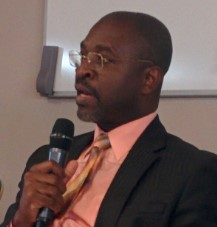
With hindsight, in the majority of countries where funding for statistics has never been secured, the occurrence of shocks such as the Coronavirus pandemic is often followed by greater restrictions on resources insofar as health is the financial priority. AFRISTAT has been able to observe a relative fall-off in its member states’ enthusiasm for contributing to the funding of its activities. Moreover, its funding partners did not finance the projects planned for 2020.
Ultimately, the health crisis has had an overall negative effect on statistical activities. On the other hand, recent gains in terms of technical and technological development will doubtless constitute factors in the optimisation of this aspect once the health crisis becomes less marked.
What impact has the crisis had on activities for providing technical assistance to
AFRISTAT member states?
AFRISTAT’s technical assistance to member states relates to monitoring and consultancy,
training and technical support tasks. At the height of the crisis, there was a considerable
expansion in remote training and consultancy. Technical assistance assignments were
halted and remote monitoring quickly proved to be irrelevant.
In 2020, AFRISTAT launched its “young statisticians” programme: what is your assessment
of this and is it likely to be continued?
The purpose of this programme is to facilitate young demographers’ and statisticians’
entry into the profession and to enable experts to appropriate recent techniques through
contact with these new graduates. In its first year of implementation, the programme’s
activities were incorporated into the framework for the African sustainable development
goals monitoring project (SODDA), financed by the French Ministry for Europe and Foreign
Affairs.
The nine young people in the class of 2020 for this programme were all recent graduates from African schools of statistics (ENSEA, ENSAE, ISSEA and IFORD), five of whom carried out their training on site at AFRISTAT’s head office in Bamako, while the other four received remote training and support. The relevance and value of this is evident in the production of studies related to Sustainable Development Goals (SDGs), which will be promoted and developed with the schools, in particular. Unfortunately, due to a lack of funding, this programme could not be renewed in 2021.
Besides managing the health crisis, what are your main areas of focus in terms of
partnerships, as head of the Observatory, which is celebrating its 25th anniversary
this year?
AFRISTAT will indeed have been in activity for 25 years in 2021 and it’s an anniversary
that is being celebrated in a simple, restrained way, given the health context.
As regards historic partnerships, the one with INSEE of course springs to mind, involving collaboration that dates back to when AFRISTAT was first set up and which now mainly concerns national accounts (the ERETES tool), survey techniques and SDG monitoring. There are also annual themed seminars, organised jointly at INSEE’s training centre in Libourne (CEFIL), and collaboration on the Stateco journal.
SDGs represent a relevant framework enabling AFRISTAT to participate in the work of the United Nations’ themed task forces and in African and subregional initiatives. Projects for providing support to member states will be funded by the economic communities and other organisations in the region (ECOWAS, CEMAC, WAEMU and the ADB), primarily regarding economic statistics. The partnership began with the FAO on compiling Food Balance Sheets and the production of agricultural statistics will be continued, as will the collaborations with STATAFRIC, PARIS21 and the IMF technical support centres in the region.
AFRISTAT is also starting a collaboration with Expertise France and with scientific support from INSEE, aimed at measuring the digital economy in a number of African countries. Lastly, AFRISTAT is extending its partners’ coverage with Géosystems France for matters related to geographical information systems (GIS).
Hakama II: a three-year cooperation project with Morocco

The Hakama II project, “Technical support for the implementation of more effective and transparent public management within the framework of the organic law relating to finance law” is receiving total funding of €3.6 million from the European Union (2021-2023). This project, which just began at the start of the year, is being implemented in the form of a Pillar Assessed Grant or Delegation Agreement (PAGoDA) between the European Union and Expertise France. INSEE was asked to take part in the project’s statistical section, aimed at developing the capabilities of the High Commission for Planning (HCP), the Moroccan institution responsible for the production of statistics.
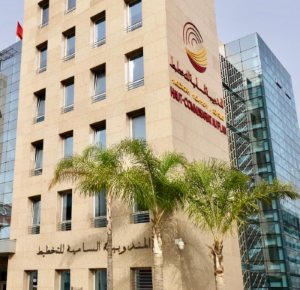
Three components: regional statistics, mixed-mode data collection and business statistics
INSEE’s support, potentially amounting to up to 300 man-days over a three-year period, relates to themes that form part of the bilateral cooperation programme with the HCP:
- Strengthening the technical capacities of HCP’s regional offices
This component is part of Morocco’s national plan for “advanced regionalisation”. It concerns the following points:- Governance: creation of an organisational model for regional offices
- Strengthening regional capacities as regards conducting surveys
- Improving communications about regional statistics.
- Introduction of mixed-mode surveys
During the health crisis, the HCP has converted face-to-face data collection methods to collection by telephone. In future, other surveys might be subject to an overhaul of their protocols, incorporating a greater variety of data collection methods (telephone, internet, tablet, etc.). INSEE will collaborate with the HCP to guide it in compiling pilot mixed-mode surveys and putting them into widespread use.
- Overhaul of the system for producing business statistics
The HCP conducts two business statistics surveys, one annually and the other on a five-yearly basis. The objective is to merge the two together into a single annual survey, involving:- the general revision of methodologies,
- optimisation of use of administrative sources,
- the drawing up of new questionnaires,
- change of data collection method.
A team of INSEE experts from different backgrounds
The scale of the project and diversity of subjects to be covered requires the deployment of a varied team of people from INSEE, including a lead expert for each component and short-term specialists.
The start-up phase gave rise to discussions with all HCP stakeholders via online conference platforms. A combination of remote and on-site activities will subsequently ensure great operational flexibility.
Box – Cooperation on regional statistics in the Hakama II project
Interview with Bertrand Kauffmann, INSEE Bourgogne-Franche-Comté Regional Director
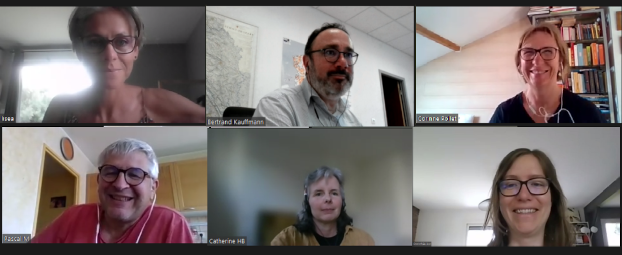
The INSEE regional statistics team for Hakama II, from top to bottom and left to right: Lise Ancel, Bertrand Kauffmann, Corinne Pollet, Pascal Mercier, Catherine Hudelot-Baysal, Dorothée Ast (Pascal Séguin was unable to attend the photo session)
Is this participation in the Hakama project your first experience of international
cooperation?
I’d already had my first experience when working in the Réunion regional office,
where I interacted with fellow statisticians from Mauritius and Madagascar. More recently,
I played a part in hosting a delegation from South Korea. Both these experiences dealt
with the population census. And 3 years ago, I got the opportunity to carry out two
assignments: one in Morocco and the other in Algeria, which were more about matters
relating to Regional Action.
What drove you to be the lead expert for the regional statistics component?
Firstly, the idea that I could offer something based on my past experience. Nine years
in Regional Action gives you quite a few ideas! And then there's my determination
that INSEE really must go and meet ALL audiences and that includes overseas colleagues.
What were the stages in defining project content and putting together a team?
As with any international project, I think that before embarking on the actual work,
it's necessary (and often very enjoyable!) to go through phases involving presentations,
conversations and discussions to get to know one another. Also, the advantage of Morocco
is that the structure of the High Commission for Planning (HCP) is very similar to
how INSEE is organised. So similarities between our two organisations could be spotted
quickly.
Once the objectives were properly established, it was easy to find experts
on each subject. That’s one of the advantages of mobility: knowing a lot of people
in the Directorate General and within the regional offices, in various fields. When
it came to getting them on board, once they overcame their initial surprise (these
are not “usual” tasks), following a quick conversation, all the experts gave me a
positive response. Firstly, because the task is spread over three years, which is
reassuring. And then because each expert is working within their field of expertise.
Their investment in this project is not negligible but neither does it require them
to gain new skills. It’s more a matter of sharing those they already have.
How are the work sessions held with the HCP?
Via video-conference! With lots of preparation beforehand and precise, targeted
agendas. But that doesn’t take the place of direct contact.
This project brings together numerous activities focused on common objectives. How
does it differ from more ad hoc technical support activities?
The scale of the project. The diversity of those involved. The fact we are
called to go further in order to meet our Moroccan colleagues’ requests.
What do you get from your participation, both professionally and personally?
Open mindedness towards new colleagues, other cultures and other problems.
And despite our differences, we are connected by statistics. It’s a strong, fascinating
link to be nurtured by going beyond administrative borders. I encourage everyone to
participate in and live this kind of experience!
“Food security in Covid-19 times: the measurement challenges”
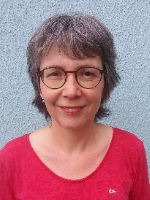
Interview with Sandrine Dury, Research Director at the French Agricultural Research Centre for International Development (CIRAD).
This theme was part of the series of online conferences run since June 2020 by INSEE, AFRISTAT, Paris21 and the United Nations Economic Commission for Africa (UNECA).
Ouvrir dans un nouvel ongletOn 10 and 11 March 2021, over 130 statisticians, researchers and decision-makers had the opportunity to discuss their experiences on adapting standardised tools and information systems in countries in sub-Saharan Africa and Maghreb, through presentations by experts from the national statistical institutes of Morocco and Mali, AFRISTAT, the FAO (United Nations Food and Agriculture Organization) and CIRAD.
What sticks in your mind most about these discussions of experiences of food security
issues?
I loved the discussion about the Food Balance Sheet, which follows an accounting-approach
based on availability. It does not enable you to measure consumption but rather to
say what is available. This is an important discussion as many people think the prevalence
of undernourishment, measured in Mali, for example, as 6% of people being undernourished
in the period from 2015-2018, is a real count, whereas it's actually an estimate based
on cereal availability. It's important in preventing food crises such as the existing
one in the Sahel region. But it is not done to find out who is malnourished or to
locate these people. There are other tools for that but unfortunately, typical income
and expenditure surveys are underused for this purpose, whereas they take up considerable
sums of money, a great deal of energy and the national statistical offices’ time and
commitment for a period of many months. Exhausted at the end of the collection process,
the teams have no time for any in-depth data analysis. Researchers’ access to the
data still remains limited, which is a pity.
What key message would you like to convey?
You have to think about food systems as a whole and equip yourself with tools
to understand and support them. Food systems include the producers, all of the middlemen
in the supply chains (hauliers, food processors and catering operators) and all consumers.
They supply food and contribute to food security and nutrition security (measured
in the balance sheets) but they also provide jobs and solidarity between town and
countryside and have measurable environmental effects (contribution to greenhouse
gas emissions and role on natural and cultivated biodiversity). What we researchers
would now like is to reveal the progress made in combating poverty and assess the
performance of every facet of food systems.
Varied ability to adapt
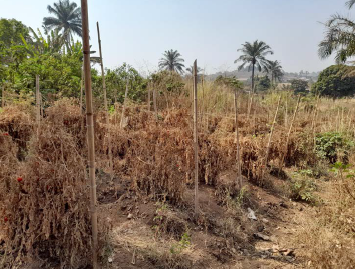
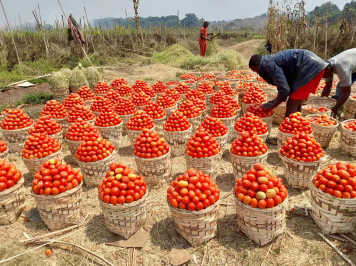
©Sandrine Dury, Foumbot, Western Cameroon, February 2021
Prospects for broadening dissemination of ERETES in a new multilingual version
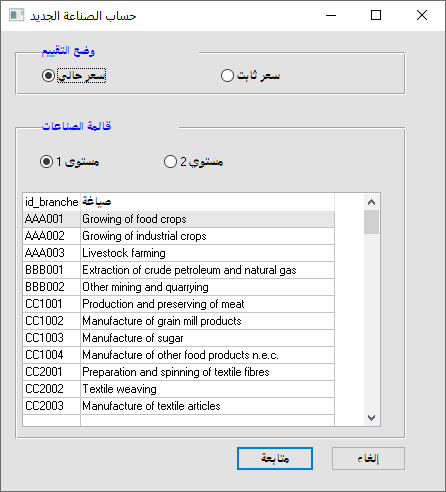
Mock-up of an industry account selection screen in the Arabic version of ERETES
ERETES, the system for assisting national accounts compilation, jointly managed by INSEE and Eurostat, has been rolled out mainly in Africa and in French-speaking countries. Appropriation of the system has been facilitated in these countries not only by the common language they share but also by the close similarity between the methods used there for compiling annual national accounts and the French accounting approach. English and Spanish versions of the system were introduced in 1999 to expand its distribution. The Spanish version enabled it to be distributed in South America and in Equatorial Guinea. The English version, however, is still not used much, primarily because certain English-speaking countries wrongly fear that ERETES is not suitable for their accounting practices (centred on production accounts).
The plan was to incorporate new languages as part of improvements to the system. The design of the system therefore has to be completely reviewed so as to convert it into a single, dynamic multilingual system, enabling the user to move from one language version to another ‒ the different language versions are currently independent of one another and require separate installation. The main advantage of such a system is, above all, the attachment of a language database incorporating menus and messages. A dedicated interface means it will be easy to add another language (including in a non-Latin alphabet), on demand, by translating the corresponding 5,000 strings of characters.
This new development in the system meets demand from Arabic-speaking countries in particular: in 2016, Jordan, a country with a great interest in the system, expressed its wish for an Arabic version. In 2018, Qatar and Oman made the same request. More recently, Sudan opted for ERETES for compiling annual accounts, relying especially on the availability of the Arabic version.
The Arab Monetary Fund (AMF) organised a workshop for its member countries* from 29 June to 1st July 2021 to promote the ERETES system, with the prospect of the future provision of an Arabic language version of the system that could be set up in the interested countries by Arabic-speaking national accounts experts from the various Maghreb NSIs.
The plan is also for the future multilingual version, which will be available by October 2021, to include a Portuguese version to meet the needs of users in Brazil and Portuguese-speaking countries in Africa (Guinea-Bissau, Cape Verde, Mozambique, Angola, São Tomé and Príncipe). All of the official languages of the continent of Africa will thus be “covered” by the ERETES system. This experimentation and new version will open the way to broadening the user community and allowing future demand to be met.
*Algeria, Bahrain, Comoros, Djibouti, Egypt, Iraq, Jordan, Kuwait, Lebanon, Libya, Mauritania, Morocco, Oman, Palestine, Qatar, Saudi Arabia, Somalia, Sudan, Syria, Tunisia, the United Arab Emirates and Yemen
In brief: INSEE’s cooperation activities in the first half of 2021
Regional activities
-
Paris21 – INSEE - Afristat – Uneca Series of themed conferences
6th and 7th webinars related to the Covid-19 health crisis
French-speaking countries in sub-Saharan Africa and the Maghreb region
- Ouvrir dans un nouvel ongletFood security in Covid-19 times: the measurement challenges
- Ouvrir dans un nouvel ongletDialogue between the media and producers of public statistics: how and why?
Webinars
March / June
-
COMMUTING BETWEEN HOME AND WORK
Discussion forum with the NSIs of Algeria, Lebanon, Morocco, Serbia and Tunisia
Online conference
February
-
ECONOMIC COMMISSION FOR AFRICA
Training in alternative data collection methods for the Consumer Price Index
Webinar
January-February
-
SCHOOLS OF STATISTICS IN SUB-SAHARAN AFRICA AND THE MAGHREB
Discussion forum on running a scientific journal: the case of Statéco
Webinar
April
Sub-Saharan Africa
-
CAPE VERDE
National accounts
Creation of a new database, in line with the 2008 System of National Accounts (2008 SNA).
Online conferences and remote discussions
January to April
-
AFRISTAT
National accounts
International conference on national accounts and their implications for public life, organised by AFRISTAT
Webinar
February
-
CENTRAL BANK OF WEST AFRICAN STATES
Panel techniques for economic outlook surveys
Work session via online conferencing and remote discussions
March
-
AFRITAC WEST
National accounts
Workshop on national accounts quality, organised by AFRITAC West for countries in West Africa (Benin, Burkina Faso, Côte d'Ivoire, Guinea-Bissau, Mali, Mauritania, Niger, Senegal, Togo and Guinea).
Webinar
April
-
MAURITANIA
Governance of the statistical system
Hosting a visit from the Mauritanian minister for economic affairs and the promotion of productive sectors to set up support for ANSADE, Mauritania’s new institute of statistics.
In-person visit
March

The Director-General of INSEE, Jean-Luc Tavernier, and the Mauritanian minister for economic affairs, Mr Ousmane Mamadou Kane
-
SUDAN
ERETES
Presentation of the ERETES system to the Sudanese national statistical institute as part of the EU-funded project to support the country’s economic transition.
Online conference
April
The Maghreb and Mediterranean Basin
-
ARABIC COUNTRIES
ERETES
Workshop on compiling national accounts with the aid of the ERETES system, organised by the Arab Monetary Fund as part of the ARABSTAT initiative
Webinar
June-July
-
MAGHREB
Mixed-mode data collection and telephone surveys
Presentations and discussions on the prospects for setting up mixed-mode surveys NSIs of Morocco, Tunisia and Algeria
Online conferences
January
-
ALGERIA
Setting up an agricultural statistics database
Modernisation and development of the database submitted by the Ministry of Agriculture
Online conferences and remote discussions
March
-
MOROCCO
Hakama II Project
Setting up and start of a three-year project
Online conferences and remote discussions
January-June
-
TUNISIA
“New database” project
Change to the national accounts database and alignment with the 2008 SNA
Online conferences and remote discussions
February-June
Europe and Asia
-
UKRAINE
Import prices
Support for SSSU regarding the methodology and software used to calculate import prices in France
Online conferences
April - May
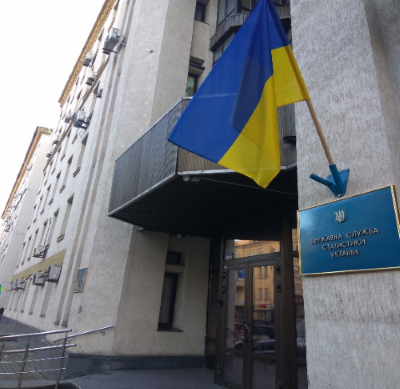
- Statistics Through Eastern Partnership (STEP)

JDemetra+ training
Training in the calculation of the labour cost index
Online training
April
Online study visit regarding international trade statistics
Visit offered in collaboration with the Banque de France regarding Statistics on
International Trade in Services (SITS) and Foreign Affiliates Statistics (FATS)
Online conferences
June



Having taken over as head of AFRISTAT in January 2020, just before the start of the Covid-19 crisis, do you see this lasting context as a handicap or an opportunity?
AFRISTAT, like all stakeholders in the international statistical system, very quickly incorporated the need to familiarise themselves with use of remote communications platforms for carrying out their activities. In order to solve the problem of collecting data while complying with physical distancing measures, various types of surveys have been developed or strengthened to ensure the availability of a minimum information base to guarantee continuity in the production of statistics.